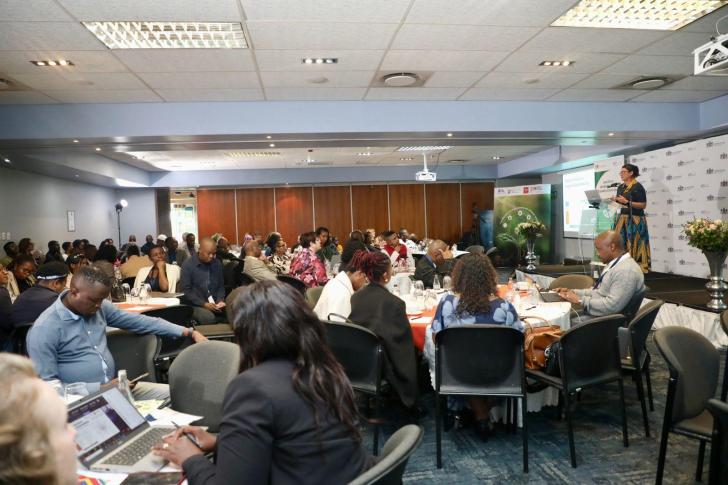News / Africa
Linking Scientific Solutions With Socio-economic Needs Leads To Successful Environmental Conservation
26 Oct 2024 at 20:27hrs |
23 Views

Participants at the Sixt Annual Gauteng Environmental Research Symposium
Johannesburg - The world, including South Africa's Gauteng Province which includes the City of Johannesburg, is increasingly acknowledging that scientific solutions to environmental challenges can only succeed when they take into account, the people's socio-economic needs.
This was revealed by environmental scientists at the Gauteng Environmental Research Symposium (GERS) held at the University of Johannesburg on 21 October 2024.
"Our gathering today aims to find solutions to overcome barriers to policy implementation, whether they are financial, logistical or due to lack of public engagement," said the Member of the Executive Council (MEC) for the Gauteng Department of Environment, Ms Shyla Mary Peters. "We seek to ensure that our environmental goals translate into a more sustainable and resilient future for all."
MEC Ms Peters said that our climate change responses require us "to have a change of mind as well."
"Climate change is the business of all of us," she said. "Unless we do an educational drive there won't be a change - we clean today and tomorrow there will be dirt again".
With the theme "sustainability: translation from policy to practice" - the Sixth GERS discussed and determined the steps that can encourage a transition from policy-to-practice as well as promote inter-disciplinary collaboration and strengthen knowledge-sharing.
Explaining the policy-to-practice practical approach to environmental management, Professor Erica Kramer, Chairperson of the University of Johannesburg-based Transformative, Innovation and Policy Consortium said that "there is a need" to use a people-centred (social-technical system environmental management approach).
The approach requires the need for all sectors of society to consult one another on the need to change the environmentally harmful ways of life and replace them with a culture of environmental conservation.
Professor Cramer said that shared agendas "recognise that radical changes in current sociotechnical systems are needed to accelerate" green and just transitions, going beyond just developing and adopting new technologies.
She said that one of the identified challenges faced by the Gauteng Province "is the ongoing pollution" of rivers such as Klip (Soweto), Juskei (Alexandra) and Hennops (Tembisa) with sewage, chemicals and solid wastes.
To address this challenge, the University of Johannesburg is working in partnership with the Gauteng Department of Environment, communities, NGOs and the industries that discharge harmful wastes into the rivers, to make the Gauteng Province's rivers cleaner.
Worldwide, including Gauteng, rivers are lifelines for our communities, and our wildlife and are important to the future of our cities.
Meanwhile, the Gauteng Department of Environment Head of Department (HOD), Blake Mosley-Lefatola said that "if we fail to translate policy into practice effectively, the consequences for Gauteng could be severe."
"Unaddressed plastic pollution may lead to further environmental degradation, impacting ecosystems and human health, inadequate water management would worsen water shortages and reduce the availability of clean water for the communities, " said HOD Mosley-Lefatola.
About the writer: Emmanuel Koro is a Johannesburg-based international award-winning journalist who writes independently on environmental and developmental issues in Africa.
This was revealed by environmental scientists at the Gauteng Environmental Research Symposium (GERS) held at the University of Johannesburg on 21 October 2024.
"Our gathering today aims to find solutions to overcome barriers to policy implementation, whether they are financial, logistical or due to lack of public engagement," said the Member of the Executive Council (MEC) for the Gauteng Department of Environment, Ms Shyla Mary Peters. "We seek to ensure that our environmental goals translate into a more sustainable and resilient future for all."
MEC Ms Peters said that our climate change responses require us "to have a change of mind as well."
"Climate change is the business of all of us," she said. "Unless we do an educational drive there won't be a change - we clean today and tomorrow there will be dirt again".
With the theme "sustainability: translation from policy to practice" - the Sixth GERS discussed and determined the steps that can encourage a transition from policy-to-practice as well as promote inter-disciplinary collaboration and strengthen knowledge-sharing.
Explaining the policy-to-practice practical approach to environmental management, Professor Erica Kramer, Chairperson of the University of Johannesburg-based Transformative, Innovation and Policy Consortium said that "there is a need" to use a people-centred (social-technical system environmental management approach).
The approach requires the need for all sectors of society to consult one another on the need to change the environmentally harmful ways of life and replace them with a culture of environmental conservation.
Professor Cramer said that shared agendas "recognise that radical changes in current sociotechnical systems are needed to accelerate" green and just transitions, going beyond just developing and adopting new technologies.
She said that one of the identified challenges faced by the Gauteng Province "is the ongoing pollution" of rivers such as Klip (Soweto), Juskei (Alexandra) and Hennops (Tembisa) with sewage, chemicals and solid wastes.
To address this challenge, the University of Johannesburg is working in partnership with the Gauteng Department of Environment, communities, NGOs and the industries that discharge harmful wastes into the rivers, to make the Gauteng Province's rivers cleaner.
Worldwide, including Gauteng, rivers are lifelines for our communities, and our wildlife and are important to the future of our cities.
Meanwhile, the Gauteng Department of Environment Head of Department (HOD), Blake Mosley-Lefatola said that "if we fail to translate policy into practice effectively, the consequences for Gauteng could be severe."
"Unaddressed plastic pollution may lead to further environmental degradation, impacting ecosystems and human health, inadequate water management would worsen water shortages and reduce the availability of clean water for the communities, " said HOD Mosley-Lefatola.
About the writer: Emmanuel Koro is a Johannesburg-based international award-winning journalist who writes independently on environmental and developmental issues in Africa.
Source - Emmanuel Koro
Join the discussion
Loading comments…




































